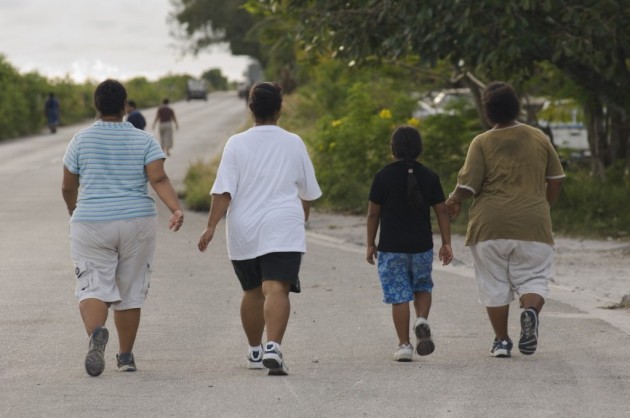The nation’s obesity problem blamed for the increase

Physicians and health experts continue to se a rise in the percentage of American children with type 2, which usually affects adults. The leading cause for diabetes in children, they said, is obesity, which is still on the rise. Photo Courtesey Wikipedia Commons
NEW YORK – Meagan Charles is a nursing student at Medgar Evers College in Brooklyn, N.Y. She also one of the rising number of Americans diagnosed as children with diabetes.
“I was 13 when I was diagnosed with Type 2 diabetes,” Charles, now 22, said. “It was one of those things I didn’t understand at such a young age, I just knew that my father had it.”
Diabetes, which can cause kidney failure, heart disease and amputations of legs and toes and even death, is a condition in which the body does not properly process food for use as energy. Most of the food people eat is turned into glucose, or sugar, for their bodies to use for energy. In diabetics, the pancreas can’t make enough of the hormone insulin to help glucose get into the cells of our bodies.

Meagan Charles, now 22 and a nursing studentm was diagnosed with
type 2 diabetes when she was 13.. Photo Courtesy Meagan Charles.
Type 1 diabetes is usually diagnosed in children and young adults. It was previously known as juvenile diabetes. Only 5 percent of people with diabetes have this form of the disease. Actress Halle Berry is one of the small percentage of people with type 1 diabetes.
Type 2 is usually diagnosed in adults. It can be genetically passed on by parents or grandparents. It is most often caused by obesity in children and obesity is the leading cause in adults. The prevalence of childhood type 2 diabetes jumped more than 30 percent from 2000 and 2009, according to a study by the Pediatric Academic Societies.
Additionally, childhood obesity continues to climb, the study found. 35.1 percent of U.S. children were overweight or obese in 2016 — a sharp 4.7 percent increase from just two years earlier according to a study by Duke University. Maintaining the proper diet is vital for diabetics. Too many sugar-creating carbohydrates or not enough can cause severe illness, and even death.
Growing up, Charles said, she watched as her father struggled with diabetes and the health issues that can accompany the disease.
“If my mom didn’t cook the right foods for my dad, or if he didn’t eat on time, he would feel sick,” she said. “Sometimes he would become so weak he wouldn’t be able to do much for a few days.”
After Charles was diagnosed, her mother, Maxiene Charles, found herself caring for her husband but her newly diagnosed diabetic daughter.
“It was scary knowing that my child was diabetic,” she said. “At times it got frustrating, if she didn’t want to eat what I had prepared. It’s still a struggle but we’re getting there.”
Charles had difficulty transitioning to her new diet to keep her diabetes under control. She ended up in the hospital at age 17 after not monitoring her diet properly, she said.
“I was on my way home from class when I started feeling dizzy,” she said. “I actually drove myself to the hospital and my father met me there.” Charles had almost slipped into a diabetic coma, which could have been fatal if she didn’t go the hospital when she did, her doctors told her.
Charles’ Type 2 diabetes has followed her into adulthood.
Dr. Shurla Charles-Gonsalves, a family medicine physician in New York City, said one of the leading causes of diabetes in children is obesity, largely from consuming sugar-laden beverages, overeating or eating foods high sugar – candies, cakes, donuts, brownies – or too many carbohydrates.
“We’re seeing more and more children become overweight and obese at young ages, this will often set them up for diabetes now or later in life.” Charles-Gonsalves said.
“We have to understand that socioeconomic issues are also leading factors when it comes to dealing with diabetes. “It is a privilege to be able to eat healthy and pay for medications and treatments for diabetic patients.”
Children re usually diagnosed with diabetes after displaying a symptom, the doctor said.

Maureen Monaghan a clinical and pediatric psychologist and certified
diabetes educator, said childlhood diabetes can cause depression.
“That child may be always thirsty, always going to the bathroom and even eating a lot of food but not gaining weight,” she said.
We often see diabetes affecting children physically, whether it be weight gain, injecting insulin, or feeling any of the symptoms signaling diabetes, but rarely do we acknowledge the psychological effects this disease can have on people, especially children.
Maureen Monaghan, a clinical and pediatric psychologist and certified diabetes educator in the Childhood and Adolescent Diabetes Progst year.
Monaghan said the effects of a diagnosis of diabetes on children varies from patient to patient
“We have children as young as 1 and 2 that are diagnosed with type 1 diabetes,” said Monaghan, “That is very different from a 14-, 15- or 16-year-old with Type 1 diabetes. We have to think about the family and their ability to cope and adjust. There may be some grief and in-denial thinking, but some families are also impressed with how their child is handling their diagnosis.”
As diabetes diagnosis rates are increasing, deaths among children are also occurring, Monaghan said.
“We have lost a few of our patients to diabetes, I wouldn’t say a lot but thankfully it is fairly rare,” she said. “If patients do pass away due to Type 1 diabetes it is either because of an extreme high glucose level or an extreme low glucose level (in Type 2.
Or, she said, they can die because they can’t afford the insulin they desperately need.
A month’s supply of insulin typically costs a few hundred dollars for those without medical insurance, and diabetics cannot survive without insulin injections or pills.. Even though deaths from diabetes in children are less likely to occur, if diabetes isn’t managed correctly daily as a child and later as an adult, complications related to the disease can cause server problems. e.
Last year Meagan Charles got a wake-up call when her father lost a limb to diabetes.
“When my dad got his foot amputated, I knew things had to change.” Charles said.
Charles suggested people who suspect they or someone they know might be diabetic, to schedule an appointment with a doctor to screened.
“I think everyone should get screened for diabetes,” she said. “It’s better to know now, than be sorry later.”









